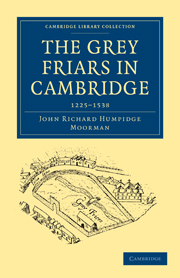Book contents
- Frontmatter
- Contents
- PLATES
- MAPS AND PLANS
- Preface
- Chapter I The House of Benjamin the Jew: 1225–1267
- Chapter II The Friars and the University: 1225–1306
- Chapter III The New House
- Chapter IV Domestic Affairs
- Chapter V Some Activities of the Friars
- Chapter VI The Franciscan School at Cambridge in the Fourteenth Century
- Chapter VII The Latter Years
- Chapter VIII The Dissolution and After
- Appendix A Custodes, Wardens, Vice-wardens and Lectors
- Appendix B Biographical Notes on Cambridge Franciscans
- Appendix C The Dispute between the Friars and the University of Cambridge, 1303–6
- Appendix D James Essex's Observations on the Old Chapel of Sidney College in Cambridge
- Appendix E Fragment of an Account-book belonging to the Cambridge Franciscans
- Appendix F Legacies
- Appendix G Documents connected with the Dissolution
- Appendix H Seals of the Cambridge Franciscans
- Index
- Plate section
Chapter IV - Domestic Affairs
Published online by Cambridge University Press: 07 September 2010
- Frontmatter
- Contents
- PLATES
- MAPS AND PLANS
- Preface
- Chapter I The House of Benjamin the Jew: 1225–1267
- Chapter II The Friars and the University: 1225–1306
- Chapter III The New House
- Chapter IV Domestic Affairs
- Chapter V Some Activities of the Friars
- Chapter VI The Franciscan School at Cambridge in the Fourteenth Century
- Chapter VII The Latter Years
- Chapter VIII The Dissolution and After
- Appendix A Custodes, Wardens, Vice-wardens and Lectors
- Appendix B Biographical Notes on Cambridge Franciscans
- Appendix C The Dispute between the Friars and the University of Cambridge, 1303–6
- Appendix D James Essex's Observations on the Old Chapel of Sidney College in Cambridge
- Appendix E Fragment of an Account-book belonging to the Cambridge Franciscans
- Appendix F Legacies
- Appendix G Documents connected with the Dissolution
- Appendix H Seals of the Cambridge Franciscans
- Index
- Plate section
Summary
When Saint Francis first drew up a Rule for his brethren he declared that they were to live ‘without possessions’ (sine proprio). No doubt he meant these words to be taken quite literally. The Friars Minor were to have nothing that they could call their own—not even the clothes in which they stood—but were to be entirely dependent upon the goodwill of the world. But when the Order grew and attracted to itself men who had not come under the direct inspiration of the saint it was inevitable that difficulties should arise over this sine proprio clause and that explanations and interpretations should be demanded. During S. Francis' lifetime it was impossible for much to be done towards meeting this demand. On this point he was adamant, maintaining to the very end that the Lord had revealed to him this way of life. But after his death changes began to take place; and, by means of papal bulls and more or less official expositions of the Rule, various relaxations crept in, bringing the friars more and more into line with the existing possessionate orders of monks and canons. There was, of course, much opposition to this, and the story of the struggle between those who wanted to maintain the primitive ideal of an Order of vagrant evangelists and those who were prepared to allow certain relaxations in the cause of greater stability and efficiency is perhaps the most important aspect of Franciscan history during the thirteenth century.
- Type
- Chapter
- Information
- The Grey Friars in Cambridge1225–1538, pp. 62 - 75Publisher: Cambridge University PressPrint publication year: 2009First published in: 1952



